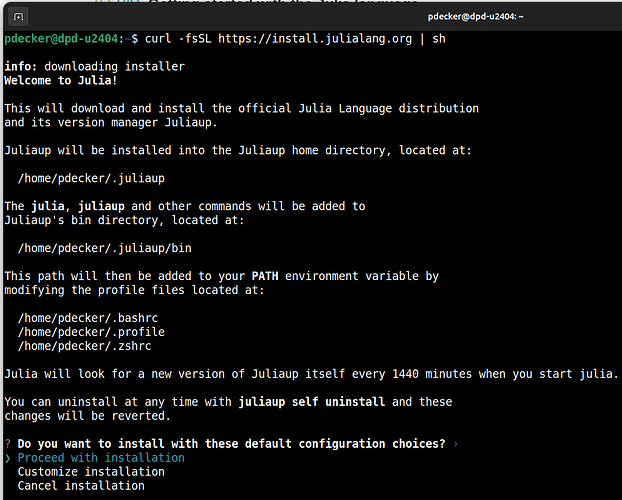The Julia language is not a general purpose programming language , like C or Rust. It is specialised for numerical calculations of the type commonly used by mathematicians or scientists. As such it is an alternative to Matlab , Octave or maybe R.
The feature of Julia that interests me is that it makes parallel programming easy… ie I can write code that will use all available CPU threads. That helps with large calculations.
I had one previous try at learning Julia, but it stalled. I am making a fresh start here.
Installing Julia
The official JUlia website is here
It offers various types of download and it pushes very strongly for one to use the downloadable version of Julia, and not some earlier version from your package system. That goes a bit against my grain, but I did it,
trinity:[nevj]:~$ cat wget.out
trinity:[nevj]:~$ wget https://julialang-s3.julialang.org/bin/linux/x64/1.11/julia-1.11.4-linux-x86_64.tar.gz
--2025-03-28 20:26:15-- https://julialang-s3.julialang.org/bin/linux/x64/1.11/julia-1.11.4-linux-x86_64.tar.gz
Loaded CA certificate '/etc/ssl/certs/ca-certificates.crt'
Resolving julialang-s3.julialang.org (julialang-s3.julialang.org)... 2a04:4e42:62::561, 199.232.138.49
Connecting to julialang-s3.julialang.org (julialang-s3.julialang.org)|2a04:4e42:62::561|:443... connected.
HTTP request sent, awaiting response... 200 OK
Length: 266267808 (254M) [application/x-tar]
Saving to: ‘julia-1.11.4-linux-x86_64.tar.gz’
julia-1.11.4-linux- 100%[===================>] 253.93M 16.6MB/s in 17s
2025-03-28 20:26:48 (14.8 MB/s) - ‘julia-1.11.4-linux-x86_64.tar.gz’ saved [266267808/266267808]julia-1.11.4
I did the install as ‘nevj’ , not root.
It was very fast. What I ended up with was a file called julia-1.11.4 in my home directory
trinity:[nevj]:~/julia-1.11.4$ ls -F
bin/ etc/ include/ lib/ libexec/ LICENSE.md share/
The whole install is there inside that file, and nothing else is written anywhere on your system. You can move it to anywhere you want, and to uninstall you just remove the file recursively.
NOTE: I have since discovered that the above wget download is unnecessary.
One only needs to do thhe curl download ( see below)
I have since deleted the ~/julia-1.11.4 directory.
I am not sure what it is for? Juliaup does not use it.
So far, so good. Now can I run it?
trinity:[nevj]:~$ which julia
nothing found
You have to put the location of the Julia binary in your PATH.
export PATH=$PATH:/common/bin:/home/nevj/julia-1.11.4/bin
Then the julia binary can be found
trinity:[nevj]:~/juliawork$ julia
_
_ _ _(_)_ | Documentation: https://docs.julialang.org
(_) | (_) (_) |
_ _ _| |_ __ _ | Type "?" for help, "]?" for Pkg help.
| | | | | | |/ _` | |
| | |_| | | | (_| | | Version 1.11.4 (2025-03-10)
_/ |\__'_|_|_|\__'_| | Official https://julialang.org/ release
|__/ |
julia>
You get a prompt julia>. That interface is called REPL… Read, Evaluate, Print Loop. You can test things interactively there, for example
julia> function add(a,b)
sum = a+b
return sum
end
add (generic function with 1 method)
julia> add(3,4)
7
julia> exit()
OK, I tested a simple function… it works.
Updating Julia
I then discovered that I had missed out on installing the ‘juliaup’ utility which looks after updates.
So I went back and did
curl -fsSL https://install.julialang.org | sh
and this time it made directories .julia and .juliaup, and it left my julia-1.11.4 directory alone. It also added more lines to my .bashrc as follows
# >>> juliaup initialize >>>
# !! Contents within this block are managed by juliaup !!
case ":$PATH:" in
*:/home/nevj/.juliaup/bin:*)
;;
*)
export PATH=/home/nevj/.juliaup/bin${PATH:+:${PATH}}
;;
esac
# <<< juliaup initialize <<<
and I discover there is a startup file in /home/nevj/.juliaup/bin which finds the binary automatically… so I dont need the export statement I just added.
I am not sure about this complicated double stage install, and the Julia webpage does not explain it thoroughly, but I got there
Launching a Julia program from a program file
You dont have to work in the interactive REPL interface. You can put a Julia function in a text file with a .jl extension, and run it as follows
Make a file add2.jl
#! /home/nevj/.juliaup/bin/julia
function add(a,b)
sum = a + b
return sum
end
print(PROGRAM_FILE)
println(ARGS)
a = parse(Int64,ARGS[1])
b = parse(Int64,ARGS[2])
sum = add(a,b)
println(sum)
Note this file contains a function and a main program
Make it executable with chmod 755 add2.jl, then
trinity:[nevj]:~/juliawork$ julia add2.jl 4 5
add2.jl["4", "5"]
9
trinity:[nevj]:~/juliawork$
or
trinity:[nevj]:~/juliawork$ ./add2.jl 7 8
./add2.jl["7", "8"]
15
You can launch it either using julia, or as a script ( because I put in the #!.. line)
So it can handle CLI arguments, which is an essential tool.
Where to?
Big learning curve now. It took a week to get to there.
The base language is easy enough.
I need to find all the libraries of useful functions .
Some reactions
The REPL interface is a poor substitute for the equivalent R interface.
Saving work in there is cumbersome. Maybe its is my lack of practice.
There is something strange about library functions that I need to grasp.
Julia seems to be able to use them directly from the internet without keeping a local library? That is different to any language I have used.
